(39:07) Don – Well, you were my guide for the first half.
“You guys would be a good team, you’re a great pair!
(39:13) We had a great trip
(39:14) Don – Yeah, we did!
(39:15) We have all read the early literature involving the exploration of the mountains, but also the mountain trails and the early camps in Mary Schaffer’s area and all this, and then to actually go to those places and see the description that matches the same thing today is pretty impressive! It was about 20 days… It was 2001, the same year as the 9-1-1- episode in the States. I remember being at Indianhead cabin – we took a day off and jeez the radio comes on and there is all this (chaos).
(40:17) Don – It was so weird being out there…(during 911).
(40:26) Well, we continued from there and about three or four days later I guess we got to the ranch and saw the TV presentation of the whole thing. Now, that was really quite something.
(40:38) Don – BJ (Al Bjorn), was at Isabella at that cache and he didn’t have a radio and we were talking about it and he said, “What the hell is this? World War Three?” It is.
(40:52) I always remember the day that I was there. We had a really great trip though. We did a little maintenance on some of the early grave sites and Donny showed me all the beautiful areas in Banff. We did the Skyline Trail in Jasper as the first part of the journey.
(41:13) Don – That was really nice. We did it all in one day…30 some miles. It was beautiful, you could see Mount Robson really clear.
(41:31) Yeah, it is nice. A nice part of the world there. And the early trips that were up in that area. I remember one day being up there with my wife Sharon and a lightning storm came along..
We had no way to get off that ridge. It was pretty spooky!
(41:53) Don – Were you riding?
(41:54) Yeah, we had a couple of horses.
“Do you ever miss being a warden?”
(42:07) Oh yeah…I am like most wardens – there is always an interest in doing one more trip. It would be nice to do another trip, but present management has made it kind of a bit difficult, so I have lots of areas outside the park – Donny has been showing me some of his childhood riding areas outside around Millarville, and we do day trips in the foothills and up to the park boundary.
(42:38) Don – You can’t get cabins anymore…
(42:44) Well, it is sad because we were in an era when people retired you were always a welcomed visitor to come back and make a trip. I don’t see what harm it does, especially in our case – we could use our own horses.
(43:00) Don – Well, that is what they don’t want too.
(43:02) They don’t want their own horses, yet they are unrealistic and want you, if you do make a trip, (its) got to be a training trip for their staff. Well, you know we’ve done that for decades…I have to say it is kind of sad, because the whole warden culture was always based on the fact that we were a family, and that we were welcome to use those facilities after we retired. I think in a lot of good ways it is a good patrol for them. The other thing that we always did, even when we retired and first did a few trips, we would always be doing maintenance on their cabins. They don’t do hardly any cabin maintenance anymore.
(44:22) Don – Or corrals and cutting trails.
(44:26) All those kind of things that we would do just as part of a normal horse trip. (We’ve) lost any access to do it for them. That part of the whole new parks thing will hopefully come around Parks will wake up and realize that there is a certain responsibility in maintaining reasonable trail access to the backcountry part of parks. To do that you’ve got to cut the trees off a little bit, you’ve got to be around a little bit. If people have problems with bears and stuff, at least there is someone to go to. So sad that horse outfitters have left the park in Jasper – very few even enter the park for the day anymore!
(45:00) Don – Cameras do not cut trees. (Parks Canada now uses remote cameras as a way of monitoring the backcountry).
“Are there people in the backcountry?”
Yeah, there is some.
(45:07) Very few. They make essentially, I was told, one or possibly two trips a year just across the boundary to clear the windfall off. But there is no active patrol there. We used to work when we had the various districts in Jasper, we would go in there and spend two or three nights at one cabin and then we would explore, or we would monitor, or whatever the term is, the area around, for wildlife, for evidence of bear activity, and all these kinds of things. That is what you were there for, to have a little knowledge of what is in that particular district, so when a hiker comes along he knows, “Oh, well you saw a bear a few days ago at this particular spot, you want to be cautious around that area,” or whatever. You had an idea what was going on in your area. Even in terms of hunting and stuff you had an idea of who was on the boundary hunting. There were quite a few characters that you needed to be there for, because if you weren’t, the temptation sometimes was pretty high to take something on the park boundary or in the park.
(46:27) Don – You’d go and chase it out even…Yeah that happened a few times.
(46:33) I think most hunters, most outfitters are responsible, but it is like anything else…the temptation can sometimes be overriding there.
(46:46) Don – I was on both sides of the fence being tempted!
(46:50) Yes, well that is right! But that is why you were such an asset to the warden service because of your knowledge of both, outfitting and guiding and wildlife…plus just your general knowledge of where everything was and the history of the area. I think that is why we both got the CRM (Cultural Resource Manager) job. I certainly did not have the background that Don did, but I had the interest.
(47:18) Don – Oh yeah you did in Jasper.
(47:20) Like I said, I certainly learned a lot, I learned so much in those 12 years that I was the cultural guy.
(47:25) Don – That was the best job…
(47:40) Well, I think it has been more than worthwhile the only unfortunate part is that they have gone on to other ideas now. There is not the funding that there used to be to do cultural resource work, and I think that that is one of the things that should be reestablished. You know spend a little money on continuing to build the inventories and appreciation of cultural resources. I was talking to Jack Porter the other day, one of the archeologists and he was saying they haven’t been back to Jasper in four years or something…I could give you quite a rant on the PM Harper’s destructive influence, but I guess that is not part of what we are trying to do here…
The pinheads in Ottawa have been working to destroy the warden service and its perceived “power” for decades. Too much local knowledge, common sense solutions, and influence by those who know, and work with just about every park situation – the warden service. A group of highly paid, know nothing, headquarters bureaucrats, now has full control of every park, and tells the locals how they will run the park. Hell, these headquarters bafoons even receive International awards for their mismanagement, as the traditional warden service and the lifestyle of the first hundred years was eliminated!! The warden “culture” was not perfect, but a mosaic of personal skills and abilities worked toward a much better use of highly skilled, both practical and academically diverse, warden service “team” – much better than the “new” law enforcement only, park warden.
(49:41) The only other thing I would offer is you still have an interest in parks, you still consider yourself a park person. I still make trips into different parks. I haven’t for the last few years, but I have been in a number of different rivers up north, the Nahanni, the Yukon and some of the rivers that are part of the various provincial park system. Donny and I did the Chilkoot trail here a few years back. I’ve done it three times since the 1980’s. There is still a connection there with the people that are working there or retired up there like Tom Elliot. We had a great visit on the Chilkoot, with Kathy Calvert and Dale Portman. We looked up Smoky Guttman’s museum, and partied with Marv Millar and Kevin McLauglin. Kind of sad to see the closing of the old experimental farm park headquarters at Haines Junction, Kluane.
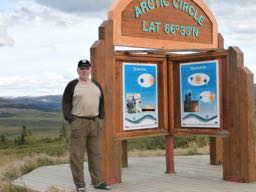
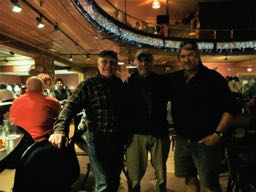
Rod Wallace at the Arctic Circle 2002 Rod Wallace, Don Mickle, Alex Brook at Diamond Gertie’s
Photos courtesy of Don Mickle.
(50:20) Don – They treated us very good!
(50:24) Yeah that was kind of a funny story, because of course at first we didn’t admit that we were retired park wardens, even when we were doing the orientation in Skagway Alaska. The lady was kind of looking at us like, “Oh, I wonder if these old guys can really do that?” She actually mentioned to the people that were registering behind us, to keep an eye on us! So we had quite a laugh when they told us that they were keeping an eye on us to make sure that we weren’t going to stumble over and die, silly ol’ farts!
(51:05) Don – (51:05 Don – Christine Hedgecock met us at the small warden cabin on top of Chilkoot Pass. She gave us hot chocolate. Christine seemed relieved that we had made it! The word was out but we were fine.
(51:33) A couple of days later we were camped with everyone else and they gave us for a big salmon feed at the camp…Lindeman Lake (complete with cold beer!). Of course then the secret was out, and everybody was wondering how we were able to get all of this special treatment…It really is a huge family. There are a lot of truly great parks people, I think that is one of my favorite memories is the people in the parks. Yeah, you know there was a time there where I was kind of a nerd – I am sure to lots of people I was kind of a grumpy old man.
(52:21) Don – They called you Rude, I am not sure about grumpy!
(52:25) We don’t need to tell that story…Anyway it was a great career, something that I never regret for a moment.
(52:43) Don – As they always say, it was a way of life you know…it is just not happening now.
(53:26) Rod – Yes, unfortunately I think it has just become a job for people. Well, I am sure there is still some…
(53:32) Don – Some of the young people coming on are keen and they probably see it as a great job – not too worried about what happened in the past.
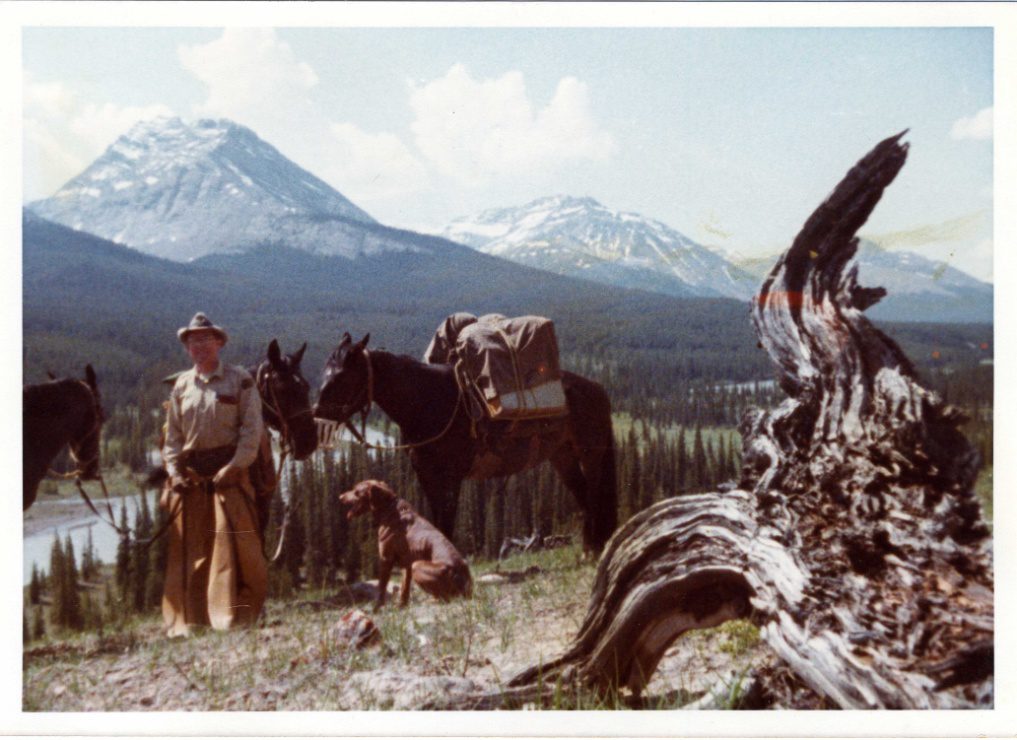
Rod Wallace – 1980 with Horses Kiwi, Hawk, and Earl and Deputy Dog, Partner above Greasebone Camp on the Brazeau River
To sum it up – Life is Good! I’m proud to have worked for National Parks, and hope in some small way, that I made a small contribution to the protection of both natural and cultural resources in National Parks – Long live Parks!
Rod Wallace, 2015
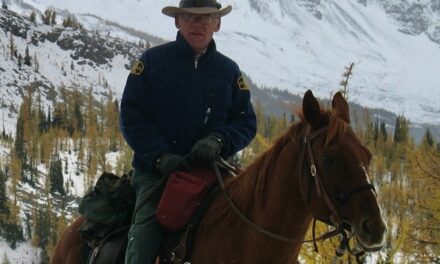
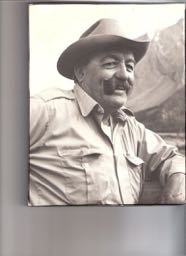
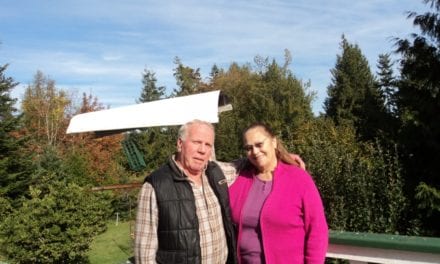
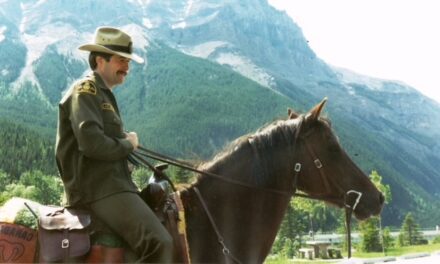
Hi Rude
Thanks for giving us a thorough synopsis of your interesting run with parks. You certainly jogged a few memories for me. I remember now of encountering you at both Rev/ glacier and Waterton in your early years. I also didn’t realize or remember that Partner became your partner. He was with a group of us on spring cleanup trip around the south in 1978 and was central in a dicey event at Isaac that should be submitted in the “Journal” section of this website.
Hi Rod.
Was nice to see Vance again. I spent 4 days with him in the Fiddle. A little unsteady on his feet but well trained. Thanks.
A friend from Waterton
Vance would tend to stumble on occasion, but only if the rider let him do so. He needed to be ridden with a gentle, but firm hand to ensure he was paying attention to the job at hand. I was fortunate to be given the horse as a four year old & worked with him while stationed at Pocahontas. He was ridden on patrol in the campground many times, as well as in the Fiddle for many years on ten day backcountry patrols. Frequent day trips were also made in all areas of the of the district & with F & W officers adjacent the Park. One of the truly great & versatile working horses of the Warden Service. RIP ol’ buddy.